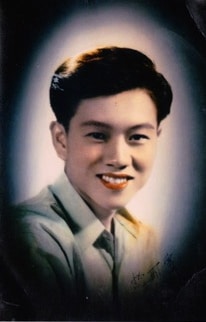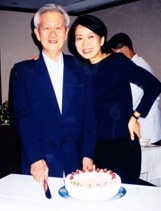My father is a believer, a motivator, and a romantic loyalist.
A soft-spoken man with an easy laugh, he always exudes a warm light no matter how heavy his heart, how dark the days.

When I think about the many ways he’s shaped my thoughts and choices since childhood, I recall stories and conversations. Here are three of the most memorable lessons that come to mind. They taught me what really matters in life, what matters to him, and how to weigh what’s worthwhile.
1. First Love
As a young man, my dad had not impressed schoolteachers but soccer coaches and screaming fans — especially the ladies. His dashing smiles, athletic agility and record scores as “the Forward” in the field had won him many hearts over the years. But he would only fall for one — my mom.

They started as high school sweethearts in the early days of innocence. Soon, their love blossomed into deep romance with pledges of together forever. “Together Forever” is more than a Hallmark catchphrase in my dad’s storybook. He believes it and lives it every day.
Since mom’s passing more than 15 years ago, dad has remained steadfast in his “one woman, one love” idealism. My brother, sister and I had tried to coax him into finding a life companion for his own sake — he would not listen. All these years since mom had “migrated to heaven,” as dad would call it, he is still holding a candle for her. My mom is dad’s only star.
Watching him live and laugh now whenever I go home for a visit, I sense his profound peace with himself. He knows he has one true love, and that’s good enough. Dad is still connected to mom — emotionally, spiritually. Sometimes when I sit quietly by his side, he would stare at me and slip “Ah-ma”… even though my Chinese nickname is “Ah-mei.” I wonder if he may be gazing at me to catch mom’s light. “You’re just like Ah-ma. You love to run around to see and discover new things.” Dad tells me that whenever he feels I haven’t visited for a while.
He’s right that I’m curious about the world, but I’ve gradually learned from him what matter most in life — love, loyalty, family.
2. First Trophy
As a child, I’d always felt that I was mediocre. I liked school but never really studied that hard to make good grades because I didn’t think my parents expected it. They never gave me pressure to excel, so I thought they must not have believed in me. How wrong I was!
One day while driving me to school in Hong Kong to pick up my 5th grade report card, my dad grabbed me by the arm just before stopping to let me out of the car. He pleaded — “Ah-mei, don’t make me lose face. Please… make it to Top 10 of your class!”
Dad might have couched his desperate plea with a half-smile, trying to make his 11th hour request seem lighter. But it was no joke to me — I took it seriously and started to panic. That was the first time he told me what he expected of me. His belief that I was not mediocre made me happy, but also made me nervous. What if I let him down?
I started praying non-stop that God would have mercy on me. Whew… I barely made it! Number nine out of a class of 48 students. It was good enough.
That report card cracked the biggest smile I’d ever seen on my father’s face.
That report card was my first trophy.
Knowing that I could bring my dad pride and joy motivated me to work harder. Since that day, I cared more about school, about setting goals and aiming higher.
3. First Car
I called dad breathlessly the day after passing my first driving test in Upstate New York.
“Dad, I got an internship! I need to buy a car to drive to work!”
I was 19 — a junior at Syracuse University, over the moon thrilled that I was about to start interning in the newsroom at WIXT-TV. As a foreign student, I couldn’t take paying jobs in the U.S. I had no money, I turned to dad.
“Buy a car? What kind of car? Can you drive? Do you really need it?”
In his no-nonsense all-business style, dad asked me simple direct questions that immediately forced me to rein in my runaway energy and excitement.
Over the course of our 10-minute long distance phone call, he challenged me on all my answers that involved a calculation and a number — everything from the age, price and mileage efficiency of the car, to my estimated number of times I’d use it for work and for other purposes.
It was an intense grilling of whether my logic, reason and my math — justified the need for getting this car. In the end, I got the car.
But I would never forget how much I’d learned from him how to weigh the cost and consequences of what I want to buy, and ask myself “is this worth it?”
My father, now approaching 84, may not remember any of this. He has dementia. But I remember. How can I forget?



